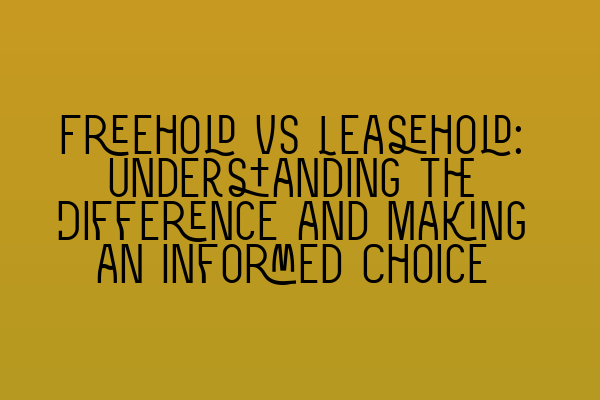Freehold vs Leasehold: Understanding the Difference and Making an Informed Choice
When it comes to property ownership, there are two primary types: freehold and leasehold. Understanding the difference between these two forms of ownership is crucial for anyone looking to purchase or invest in property. In this article, we will explore the key differences between freehold and leasehold, and provide you with the information you need to make an informed choice.
What is Freehold?
Freehold ownership is the most common form of property ownership in the UK. When you own a property on a freehold basis, you own the property and the land it sits on outright. This means that you have complete control and are responsible for the maintenance and upkeep of the property.
One of the main advantages of freehold ownership is that you have the freedom to make decisions about your property without having to seek permission from anyone else. You can extend, renovate, or modify your property without any restrictions, within the bounds of planning and building regulations.
Another significant benefit of freehold ownership is that you are unlikely to incur ground rent or service charges. This can save you money in the long run, as these costs can add up when you own a leasehold property.
It’s important to note that when you own a freehold property, you also bear the responsibility for all repairs and maintenance. This means that you may need to budget for potential expenses, such as roof repairs or boiler replacements, in the future.
Related Article: Misrepresentation in Contracts: Unveiling Deceptive Practices
What is Leasehold?
Leasehold ownership, on the other hand, is when you own the property for a fixed period of time, typically for a long-term lease agreement. In this situation, you do not own the land your property sits on; instead, you enter into an agreement with the freeholder to lease the property for a specified number of years.
Leasehold properties are commonly found in flats and apartment buildings, where multiple properties share the same land and common areas. When you own a leasehold property, you become a leaseholder and have certain rights and responsibilities as outlined in the lease agreement.
One of the primary advantages of leasehold ownership is that you are not responsible for the maintenance and repair of the exterior of the building, the communal areas, or the land. This is typically the responsibility of the freeholder or a property management company.
However, it’s essential to note that as a leaseholder, you may be required to pay ground rent, service charges, and other associated fees. These costs can vary greatly depending on the terms of your lease agreement and the management arrangements of the property.
Another important consideration when owning a leasehold property is the length of the lease. The longer the lease, the more valuable the property is likely to be. It’s worth noting that leasehold properties with shorter leases may be more challenging to sell and can be subject to potential complications during the buying and selling process.
Related Article: A Closer Look at SQE Contract Law Syllabus
Making an Informed Choice
When deciding between freehold and leasehold property ownership, several factors need careful consideration.
Firstly, think about your long-term plans for the property. If you intend to make significant modifications or alterations to the property, freehold ownership may be the most suitable option. On the other hand, if you prefer not to be responsible for the maintenance and repair of the property, leasehold ownership may be more appealing.
Secondly, consider your budget and financial situation. Freehold ownership generally means that there are no annual ground rent or service charges to pay, making it potentially more cost-effective in the long term. However, leasehold ownership often comes with service charge and ground rent obligations, so it’s important to factor these costs into your budget.
Lastly, seek professional legal advice to fully understand the terms and conditions of a leasehold agreement before purchasing a leasehold property. A solicitor specializing in property law can help you navigate through the complexities of leasehold ownership and ensure that you are well-informed about any restrictions or obligations tied to the property.
Related Article: SQE Contract Law: Analyzing Landmark Cases and Influential Judicial Decisions
Conclusion
When choosing between freehold and leasehold property ownership, it’s crucial to understand the differences and weigh up the advantages and disadvantages of each. Freehold ownership provides complete control and freedom, but with the responsibility for all maintenance and repairs. Leasehold ownership offers certain conveniences, but comes with associated fees and the potential for lease complications.
By considering your long-term plans, budget, and seeking professional advice, you can make an informed choice that suits your needs and preferences. Whichever option you choose, make sure you fully understand the terms and conditions of the ownership arrangement to avoid any surprises in the future.
Related Articles:
